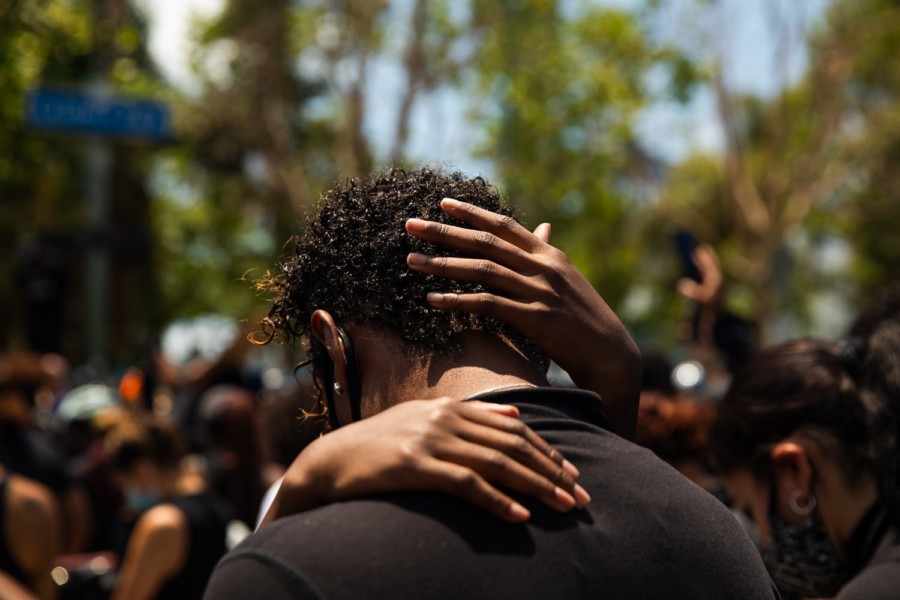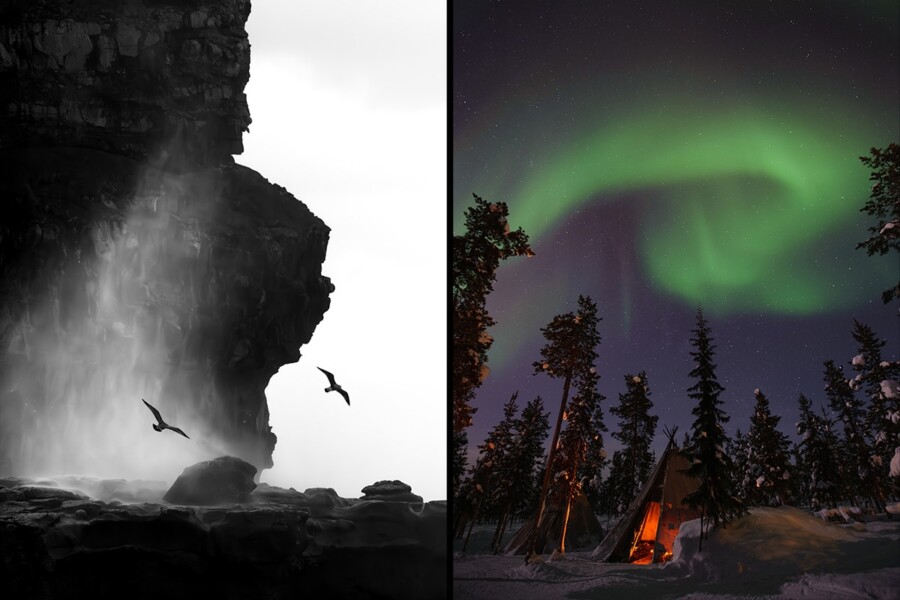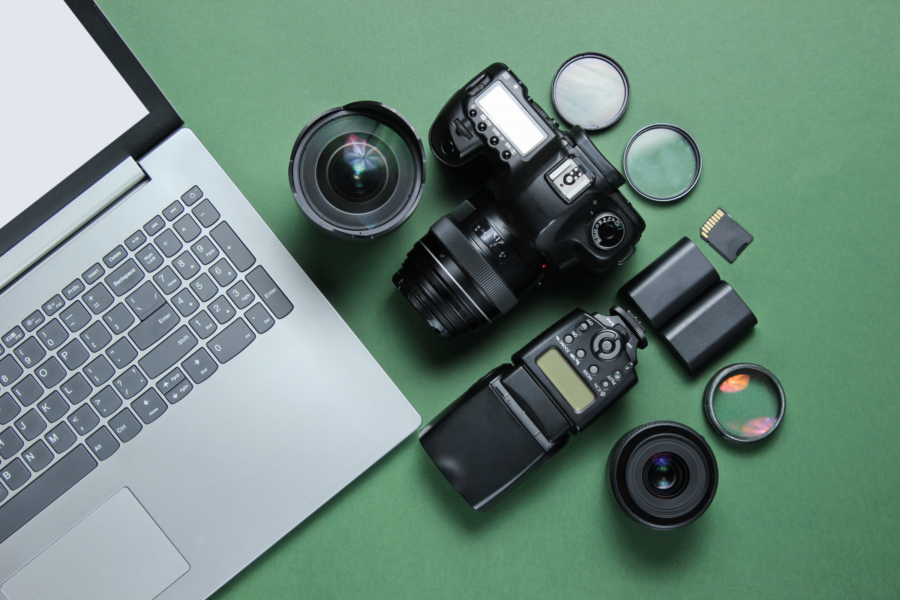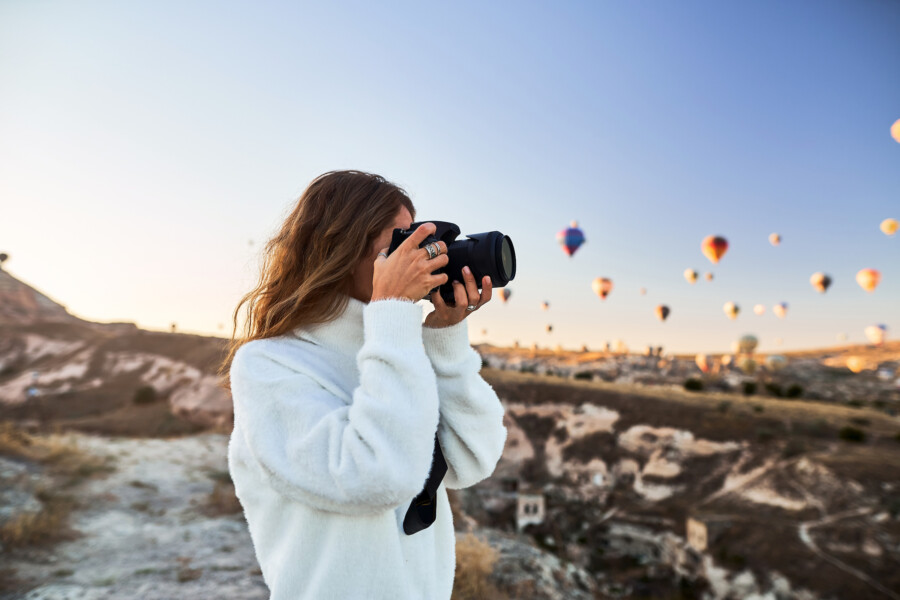Share
WATCH: The Social Effects of Photography with Black Women Photographers
Photography has long been a medium used to drive social and cultural change. The impact of documentary photography is immeasurable as both new and ...

Photography has long been a medium used to drive social and cultural change. The impact of documentary photography is immeasurable as both new and historic images play a role in how we see and interact with the world around us.
As society has shifted in the 21st century, how has the photography industry changed? What’s next and what’s needed from this impactful industry?
We sat down with Polly Irungu, the founder of Black Women Photographers, and talented independent photographers Dee Dwyer and Alexis Hunley to discuss the stories behind some of their powerful images, how the photo industry can better support Black photographers and more.
Watch to learn:
- How photography can be used as a tool for change
- The idea of image-making versus image-taking
- Each speakers’ plans for 2021
- Insights into how the photo industry can better support Black photographers
Cover image by Alexis Hunley
On-Demand Webinar: The Social Effects of Photography with Black Women Photographers
All your questions answered
Thank you to everyone for submitting questions throughout our conversation with Polly Irungu, Dee Dwyer and Alexis Hunley. Feel free to tweet any lingering questions @photoshelter.
This Q&A was edited for clarity and length.
Our friend Melissa Lyttle says, “Whenever I get a call for an assignment that I don’t feel I’d be best suited for, I have my own rule for sending editors three names of other photographers, and two-thirds of those are women of color photographers and figured that’s one of the best ways I can be a good ally. Are there any other things that you’d suggest that we non-black photographers could be doing to help support, prop up and draw attention to these amazing voices?”
Dee: I would like to say something about that. Of course, say our names in rooms of opportunity. Say our names. Seriously, say our name, show our work. You know that you have more access.
When you’re there with your friends who are editors who are hiring photographers, show our work. Because the thing is, we’re not just saying hire us because we’re Black, like we’ve been treated unfairly. We have dope work, we have amazing work, we can walk it and talk it. If you’re with us, be with us. Say our names, show our work. Put pressure on your friends who are editors, who are calling these shots, who are making these decisions. Let them know, “Look, I don’t want to take that assignment.” I understand that everyone wants the money but most white photographers that I know at least, they’re good and they’ll be good for a while.
I’ve spoken with a photographer and they said that normally they’ll get over 200 jobs per year. That’s a lot. Sharing is caring, especially when you know that we’re just as professional and we can produce great work. It’s enough for all of us. So that’s my take on that.
Also be able to receive our feedback because I know some white people, they’ll ask you, “What do you need?” And then when we tell them, they cringe. It’s too much and it’s really not. But some of them are afraid to hear the truth, so you have to be ready. If you are going to ask that question then be ready for the answer.
Alexis: Absolutely. I had quite a few white photographers that I don’t know reach out and ask how they can support me. One of the ways that was really, really helpful was access to equipment and resources. Offering to let me borrow lenses was invaluable. I didn’t have the couple of thousand dollars needed to get a telephoto, to get a 70-200. And now there’s a friend of mine who let me borrow it for a good couple of weeks because I needed it.
So doing a thing like that, offering up your equipment if you’re able to. I’ve had people send me film, I’ve had people send PPE, doing what you can, even if it’s uncomfortable to support people. Sending people money, sending people gear, giving people access, passing on assignments, talking to editors, like Dee said, putting our names in rooms. Those are real, tangible ways to provide support as you keep building your knowledge base and your relationship with people. Those things have an immediate effect and really matter.
Dee: I want to add one more thing because I noticed this last year it was a pattern for some white photographers. When we speak out about certain issues, don’t just DM us your feelings to show that you’re in solidarity with us. Don’t just hide your solidarity, comment it. Show the world, the industry that you stand with us. Because when I see a lot of white photographers do that, in my mind I’m like, “No, you’re not really about it because you’re not showing anyone.” You know that there are editors following me, the same editors are following you. So I just feel that’s them trying to play it safe. If you really stand with us, stand with us publicly, don’t do it behind closed doors.
When did you get started as a photographer and who inspired that for you?
Alexis: Oh, let’s see. That’s a layered question. I actually did not go to school for photography, for art, anything. I went to school for psychology, but I never really felt fulfilled in any of the jobs I took. I realized quickly I didn’t want to be a clinician and so I tried a whole bunch of different things and was always missing that creative piece. I was always art adjacent and in the support roles.
My grandmother passed in the beginning of 2016 and she was the artist of the family. And so as a way to grieve and stay connected to her, I kind of reconnected with my super secret desire to explore art and to be creative. I’d always had cameras, but never took… not that I didn’t take it seriously, I was really terrified of being horrible and so I wouldn’t take a photo class. Didn’t just take my photos but just kept it to myself.
After she passed, that following year in 2017, I just hit that point where I was like, “Okay, I need to do this. I don’t have any other choice. I’m not happy.” I spent a year and a half sequestered from everybody on YouTube and testing and going to the library and then took it from there. Portfolio reviews, found out about those and then just kept running. But that was my initial inspiration, out of grief.
Dee: For me, I would say, I feel like my interest started when I was a teenager, going to the Go-go’s. The Go-go’s here in D.C. It’s part of the D.C. culture. It’s a live band that plays a distinctive type of music here. Just seeing the picture booth, a lot of people from the black community they go… people in a struggle, they go to just release and be happy. I will always see people stop past the photo booth, because especially coming from an area where there’s a lot of poverty, you don’t really see a lot of people smile, right?
So the photo booth, before you hit the dance floor, you go there with your friends and you smile. That inspired me because I was just like, “Wow, my people they’re always struggling or they never really smile, but this camera is bringing their joy out.”
Fast forward to me wanting to go to college to be a criminal defense lawyer to again help my community out because I knew that they were being unfairly treated by the system. I was just like, “I can’t do this. This is too boring.” You know what I mean? The law. I was fascinated by Spike Lee, still is, and I enjoyed how he told a lot of black stories, especially stories from where he was from. I felt like where from, D.C., people always think that… They see these pretty monuments and The White House, but they don’t know that behind all of that it’s a huge struggle in D.C. I was just like, “I’m going to do this the Spike Lee way and I’m going to go to school for filmmaking and tell our stories so that people can see what’s really going on here.”
So I went to school for filmmaking, and we had to actually shoot movies on film. I had to take a black and white film photography class where I had to shoot with my Canon AE-1 and develop my film in a dark room. Seeing that and dealing with that, knowing that I didn’t have to hire a crew – I didn’t have to spend so much money because filmmaking is a lot of money. I just fell in love with the process of developing my own film. I was like, “Okay, I want to do photography, but I don’t want to lose my credits again.” So I finished my filmmaking career, was a housewife for many years, but I always loved photography.
My sister friends who were filmmakers pulled that out of me. They convinced me to go on a trip with them to Brazil back in 2015. I took pictures, went into the favela and I was just like, wow. Came back to America, started showing some of my work to help fundraise for their film and in 2016, I decided, “I am going to do this.” My marriage didn’t work out because I chose photography. So I just said, “I’m all in. This is me. This is what I’m going to do.” And I never looked back and I’m glad that I didn’t. I’m glad that I chose this medium because without photography, I feel like I’m going to go crazy guys.
Black Women Photographers is hosting their first ever print sale. Has that inspired you Dee or Alexis to print more of your work?
Editor’s note: The BWP print sale ends on February 28th, 2021.
Dee: For me yes. And I know I need to get on it because I received a lot of requests to print my work. Sometimes I do print my work and I sell it, but I’m still learning the process because I know, especially after last year, I always knew my value, but after documenting that historical year that definitely helped with my legacy. So I’m just trying to be more strategic on that.
So I’ve been dragging my feet on that because I know that those images from especially 2020 and during this whole pandemic, they’re going to mean a lot to the world. I can’t just give my work away like that. My previous work, I’d still print those, but I’ve been receiving a lot of requests specifically for 2020 work. So on the way it’s coming, guys.
Photographers, specifically black photographers, have to ask themselves internally how they feel about selling work from Black Lives Matter protests. Were you having those internal struggles about it?
Alexis: Yeah. There are certain images that I probably won’t ever produce as prints unless it’s going in a museum or maybe it’s part of a show or maybe within the context of a book so I can provide that written context. But there are some very either violent or very deeply emotional images, especially around people’s deaths that I may not even publish just because it would feel disingenuous to me. It would make me feel uncomfortable.
And I think about if that was my family and my sister or somebody that I loved was murdered, and now there’s an image at the place where they were killed or something that’s just so deeply entrenched in that pain, would I want that image being mass produced? And the answer is almost always no. So I hold a lot of my prints very close to the vest similar to Dee, trying to figure out how I want to navigate the fine art space in a way that maintains the value of my work, but also allows me to feel good about pieces that are sold, especially when there’s folks in there that I may not know personally.
During our conversation with Polly, Dee and Alexis, these photographers shared the names of other photographers who have inspired them over the years. Here is a list of those they mentioned:
- Cheriss May – @cherissmay
- Tone Mobley – @tonemobley
- Howard Cash – @verycoolcash
- Jamel Shabazz – @jamelshabazz
- Michelle Agins – @michelleagins
- Laylah Barrayn – @laylahb
- Adama Delphine – @adamadelphine
- Ernest Cole
- Gordon Parks – @gordonparksfoundation
- Montinique Monroe – @montiniquemonroe
- Vanessa Charlot – @vanessa.charlot
- Matt Sayles – @msayles
- Zerb Mellish – @obzerb
- Joshua Kissi – @joshuakissi
- Christina Poku – @christinapoku
- Anthony Geathers – @anthonybgeathers
- Adrienne Raquel – @adrienneraquel
- Dana Scruggs – @danascruggs
Who are the Black photographers who inspire you? Give them a shout-out on Twitter or Instagram and let us know @photoshelter. If you’d like to hear the entire conversation, along with the questions asked here, watch the on-demand webinar above.


